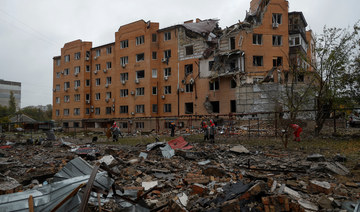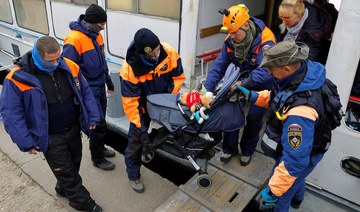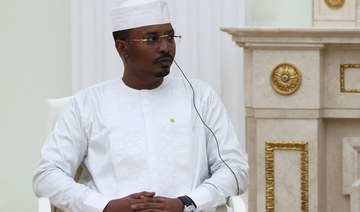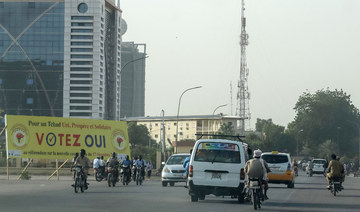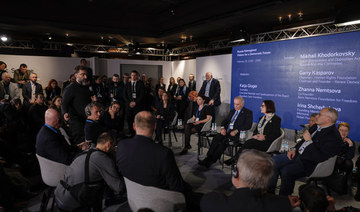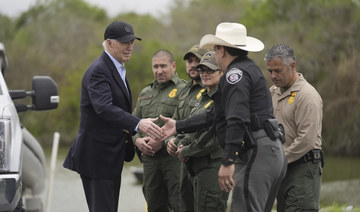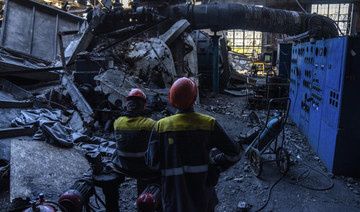KHERSON, Ukraine: Ukrainian troops at the front line said on Wednesday they were expecting a bitter fight for the southern Kherson region, which Russia now appeared to be reinforcing after days in which it seemed possible that Moscow might withdraw.
In Russia, the military staged a high-profile rehearsal for nuclear war, with state television broadcasts dominated by footage of submarines, strategic bombers and missile forces practicing launches in retaliation for an atomic attack.
Moscow has conducted a diplomatic campaign this week to promote an accusation that Kyiv is preparing to release nuclear material with a so-called “dirty bomb,” an allegation the West calls baseless and a potential pretext for Russian escalation.
The looming battle for Kherson at the mouth of the Dnipro River is expected to be one of the most consequential of the war, determining whether Kyiv can loosen Moscow’s grip on southern Ukraine.
While much of the front line remains off limits to journalists, at one section of the front north of the Russian-occupied pocket on the west bank of the Dnipro, Ukrainian soldiers said Russian shelling was stepping up again after having tailed off in recent weeks.
Radio intercepts indicated freshly mobilized recruits had been sent to the front and Russian forces were firmly dug in.
“They have good defensive lines with deep trenches, and they are sitting deep underground,” said Vitalii, a Ukrainian soldier squatting in a weed-choked irrigation canal, concealed from any prowling enemy drones by overhanging trees.
Both Russia and NATO are holding long-standing annual drills of their nuclear forces this week. But Russia has given the exercises a much higher profile than usual, timing it to coincide with its dirty bomb accusations against Ukraine.
Kyiv says Moscow has been brandishing the prospect of nuclear war to intimidate Western countries into withdrawing their support for Ukraine. Moscow said President Vladimir Putin had personally overseen the nuclear drills remotely.
The Pentagon said a day earlier that Russia had notified it of its intention to carry out the exercises, which reduced the risk of miscalculation at a time of “reckless” Russian nuclear rhetoric.
’THEY ARE FIGHTING WELL’
Ukrainian forces advanced along the Dnipro River in a dramatic push in the south at the start of this month, but progress appears to have slowed. Russia has been evacuating civilians from the pocket of territory it holds on the west bank this week but says it has no plans to pull out its troops.
Oleksii Reznikov, Ukraine’s defense minister, said wet weather and rough terrain were making Kyiv’s counter-offensive in Kherson harder than it was in the northeast, where it pushed Russia back in September.
At the front, intermittent artillery fire echoed from both sides, with towers of smoke rising in the distance.
A Ukrainian helicopter gunship swept low over the fields, loosed rockets at the Russian positions and wheeled around spitting flares to distract any heat-seeking anti-aircraft rockets fired at it.
“In the press they say the Russians are afraid and will withdraw their troops, but that is not true,” said a unit commander at the front, who asked to be quoted by his nickname, Nikifor. “They are fighting well and hitting our troops.
“In this area, they are very active. They shell every day and are digging trenches and preparing for defense,” said Nikifor, whose location in Mykolaiv province could not be identified under Ukrainian military regulations.
The unit holds a network of well fortified trenches dug into tree lines opposite the Russian fortifications, and recent rains have turned the dirt tracks that access them to mud, especially where tank treads have churned them up.
Since Russia began losing ground in a counter-offensive in September, Putin has taken a series of steps to escalate the conflict, calling up hundreds of thousands of Russian reservists, proclaiming the annexation of occupied land and repeatedly threatening to use nuclear weapons to defend Russia.
This month, Russia launched a new campaign of strikes using missiles and Iranian-made drones against Ukraine’s energy infrastructure, also hitting parks and homes across the country.
The remains of a US citizen killed in Ukraine were turned over to Ukrainian authorities as part of a prisoner swap.
Andriy Yermak, head of Ukraine’s president’s office, identified the US citizen as Joshua Jones, a US Army veteran. The US State Department, which did not identify the person, said the remains would soon be returned to the person’s family.
Ukrainians expect tough fight for Kherson; Russia stages nuclear war games
https://arab.news/wpsjy
Ukrainians expect tough fight for Kherson; Russia stages nuclear war games
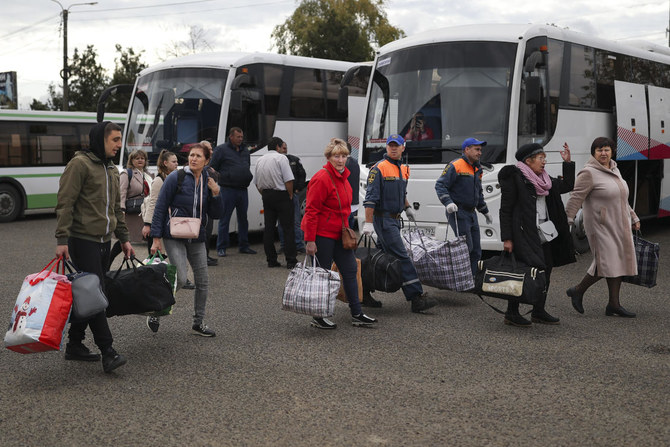
- In Russia, the military staged a high-profile rehearsal for nuclear war
- The looming battle for Kherson at the mouth of the Dnipro River is expected to be one of the most consequential of the war
Chad votes in first Sahel presidential poll since wave of coups
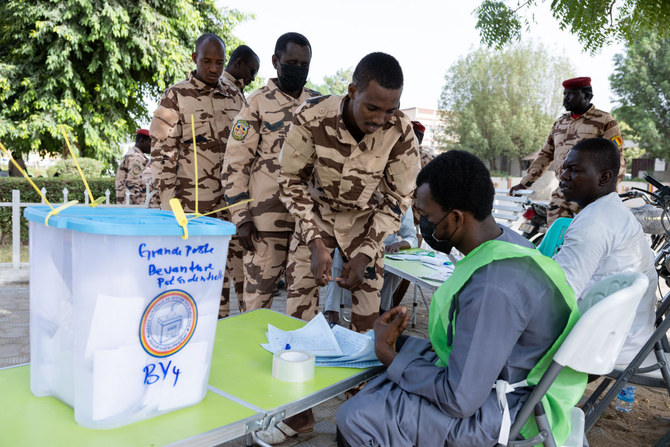
- Monday's vote pits military ruler Mahamat Idriss against his prime minister Succes Masra, previously a political opponent who fled into exile in 2022 but was allowed back a year later
N’DJAMENA: Chadians go to the polls on Monday three years after their military leader seized power, in the first presidential election in Africa’s Sahel region since a wave of coups.
Analysts say Mahamat Idriss Deby, who seized power the day rebels killed his long-ruling father Idriss Deby in April 2021, is most likely to win, although his chief opponent has been drawing larger-than-expected crowds on the campaign trail.
Deby has promised to bolster security, strengthen the rule of law and increase electricity production.
The vote coincides with a temporary withdrawal of US troops from Chad, an important Western ally in a region of West and Central Africa courted by Russia and wracked by jihadism.
Polls open at 7 a.m. and close at 5 p.m., with some 8.5 million people registered to vote.
Soldiers began early voting on Sunday.
Provisional results are expected by May 21 and final results by June 5. If no candidate wins more than 50 percent of the votes, a run-off will be held on June 22.
Since replacing his father at the helm of the oil-producing Central African country, Deby has remained close with former colonial power and longtime ally France.
While other junta-ruled Sahel countries including Mali, Burkina Faso and Niger have told Paris and other Western powers to withdraw and turned to Moscow for support, Chad remains the last Sahel state with a substantial French military presence.
The US, however, announced a temporary withdrawal of at least some troops last month, saying it would continue with a review of security operations after the election.
Opposition concerns
Monday’s vote pits Deby against his prime minister Succes Masra, previously a political opponent who fled into exile in 2022 but was allowed back a year later. Also running are former prime minister Albert Pahimi Padacke and seven other candidates.
Yaya Dillo, an opposition politician who had been expected to run against Deby despite coming from the same clan, was shot and killed in the capital N’Djamena on Feb. 28, the day the election date was announced.
Padacke has accused Masra of collaborating with Deby. But Masra has attracted large crowds to his own rallies.
Some opposition members and civil society groups have called for a boycott, citing concerns about possible vote-rigging.
That has raised fears of potential violence.
“This presidential election is of capital importance for the country because an entire people aspires for change,” said Baniara Yoyana, a former minister and magistrate.
“The process must be conducted with transparency to avoid any risk of confrontation.”
One Deby supporter, however, said he expected no problems.
“We want the election to go well and peacefully,” said Abdelkhader Sougui, a 28-year-old student.
“My wish is to go out and vote the morning of May 6 to confirm our victory... in the first round.”
Exiled Russian historian rallies fellow emigrants in dark times

- Tamara Eidelman is part of a group of exiled anti-war Russian public intellectuals and cultural figures who are rebuilding their careers abroad
- More than 800,000 Russians are estimated to have left the country in just the past two years after Russia invaded Ukraine
WASHINGTON: Russian dissident historian Tamara Eidelman was on vacation in Greece when Moscow’s tanks rolled into Ukraine in February 2022 and she realized that she would not be going back to her home country.
With her single suitcase, Eidelman, 65, flew to Portugal, where her daughter had been living, and began a new life in exile.
“I am operating under the assumption that I will not return. I am building my life in Portugal,” Eidelman, who has over 1.6 million followers on her history channel on YouTube, told AFP. “I want to come back... but if I sit every day thinking ‘When will it finally happen?’ I will go mad.”
Eidelman, who was declared a “foreign agent” by the government in Moscow, is part of a group of exiled anti-war Russian public intellectuals and cultural figures who are rebuilding their careers abroad.
While they cater to a large diaspora — more than 800,000 Russians are estimated to have left the country in just the past two years — unlike the previous waves of emigration from Russia’s calamities, they are able to continue speaking to those who stayed via social media, despite growing government restrictions.
“I think it’s one of the advantages of today’s emigration, if there can be any advantages, that our ties with our homeland have not been ruptured so drastically,” Eidelman, who wore a pin in the colors of the Ukrainian flag on her black blouse, said before a lecture in a community center outside Washington.
“Today there is an opportunity to exchange ideas. And, despite all the bans, inside Russia you can still access what is being done by those who emigrated. It is extremely valuable, it must be used and cherished.”

While exiles are unlikely to have a significant impact on political life inside Russia, “they can be the keepers of ideas, the centers of expertise and civic education,” according to Alexander Morozov, a political analyst and lecturer at Charles University in Prague.
When political change occurs, “Those who have retained trust and their symbolic capital can play a role in Russia’s renewal,” he wrote in a recent paper.
During her first few months in Portugal, Eidelman, who worked as a history teacher at a prestigious Moscow school for more than 30 years before becoming an editor, blogger and public speaker, kept herself busy looking for a place to live, reassembling her YouTube team and signing up for Portuguese lessons.
But she would catch herself thinking she was there on a brief visit and that she needed to buy a bottle of Port wine to bring back to Moscow to her mother and friends. Then it hit her.
“I felt a tremendous weight pressing on me when things had settled down a little and I realized that I am going to be in this wonderful, beautiful country for a long time,” she said. “Of course, (President Vladimir Putin’s) regime will collapse, but I don’t know if I will be around to see it.”
Since the start of Russia’s full-scale invasion, Eidelman’s YouTube channel has ballooned from some 500,000 followers to 1.63 million and a team of 30 people, with lectures on Russian, Ukrainian and world history — as well as a special presentation on Putin’s assault on democracy, which she delivered in a T-shirt that read “No Putin No War.”
“I want to express my unconditional support for Ukraine in this war and I believe that all its territories, including Crimea, must be returned to it,” Eidelman told AFP, referring to the Black Sea peninsula that Russia annexed in 2014.
During her lecture in an auditorium of several hundred Russian speakers titled “The Judgment of History,” Eidelman examined the painful questions of countries’ and societies’ culpability and responsibility for crimes from ancient Greece to Nazi Germany — with the clear undertone of Russia’s war in Ukraine.
Prosecuting those who committed direct crimes against Ukraine will not be enough, Eidelman suggested in her interview with AFP.
“I believe that there cannot be collective responsibility, that a whole people cannot be guilty,” she told AFP. “But at the same time, there must be... moral responsibility, responsibility before one’s conscience.”
Alina, a 39-year-old Russia-born quality control manager drove more than eight hours to Washington from the southern US state of Tennessee with her husband and two children to hear Eidelman speak.
To Alina, Russia’s invasion of Ukraine is “a crime against a neighboring country, but it’s also a crime against my own country because crimes are being committed in the name of people like me, who don’t agree with it.”
In these tragic times, Eidelman’s talk was a breath of fresh air, Alina said.
“When I listen to her lectures, I believe that there is — if not hope, then at least some light ahead for you to follow,” she said. “You get the feeling that you are not alone in all of this, even though physically you live apart from everyone.”
md/bgs/caw
Trump says Biden administration uses ‘Gestapo’ tactics: US media
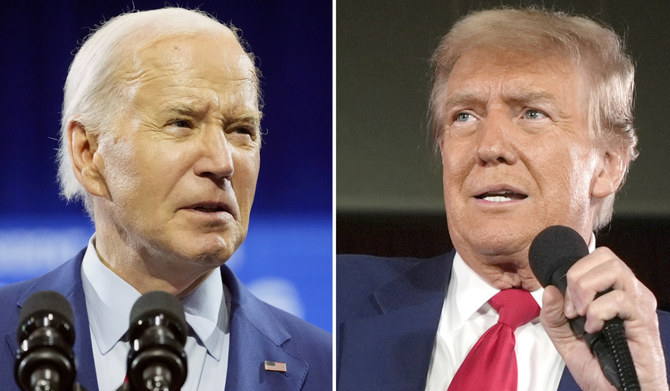
- The “Gestapo” comment came as the campaign has begun heating up, and it follows several other Trump remarks that critics have said are dangerously inflammatory, including calling political rivals “vermin” and comparing immigrants to “animals”
WASHINGTON: Former president Donald Trump has sharpened his allegation that his Democratic successor has weaponized the US justice system against him, comparing Joe Biden’s tactics to those of Hitler’s Gestapo, American media reported Sunday.
The Republican 2024 presidential candidate made the remark during a private meeting Saturday with top party leaders and wealthy donors at his Mar-a-Lago resort in Florida, according to a recording provided to US media by one donor.
In a 90-minute speech, Trump accused the Democrats of “running a Gestapo administration,” referring to the secret police force in Nazi Germany. “It’s the only way they’re going to win,” he said.
The “Gestapo” comment came as the campaign has begun heating up, and it follows several other Trump remarks that critics have said are dangerously inflammatory, including calling political rivals “vermin” and comparing immigrants to “animals.”
His comments in Mar-a-Lago brought loud applause from the audience, which included a number of potential vice presidential picks, according to Politico.
He again lashed out at the prosecutors who have brought four separate court cases against him, including the hush-money trial now taking place in New York.
Trump denounced what he claimed was a “witch hunt” hatched by the Democratic administration to eliminate his key presidential rival.
The White House, which has denied any involvement in the legal cases, denounced Trump’s comments on Sunday.
“Instead of echoing the appalling rhetoric of fascists, lunching with Neo Nazis, and fanning debunked conspiracy theories that have cost brave police officers their lives, President Biden is bringing the American people together around our shared democratic values and the rule of law,” spokesman Andrew Bates said.
Biden’s campaign also responded, saying the Republican’s angry remarks confirmed “what we already knew: Trump’s campaign is about him. His fury, his revenge, his lies, and his retribution.”
Anti-war protesters leave USC after police arrive, while Northeastern ceremony proceeds calmly
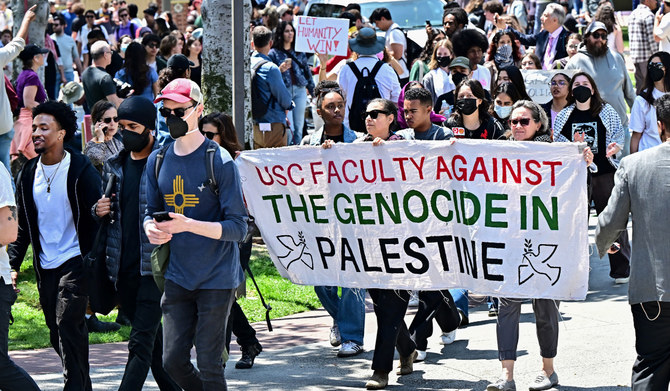
- Israel has killed more than 34,000 Palestinians, according to Gaza’s Health Ministry
WASHINGTON: Students protesting the war in Gaza abandoned their camp at the University of Southern California early Sunday after being surrounded by police and threatened with arrest, while Northeastern University’s commencement began peacefully at Boston’s Fenway Park.
Developments in both places were being watched closely following scores of arrests last month — 94 people at USC in Los Angeles and about 100 at Northeastern in Boston.
Dozens of Los Angeles Police Department officers arrived about 4 a.m. at USC to assist campus safety officers. The university had warned of arrests on social media and in person. Video showed some protesters packing up and leaving, while officers formed lines to push others away from the camp as it emptied out. The university said there were no reports of any arrests.
USC President Carol Folt said it was time to draw a line because “the occupation was spiraling in a dangerous direction” with areas of campus blocked and people being harassed.
“The operation was peaceful,” Folt wrote in an update. “Campus is opening, students are returning to prepare for finals, and commencement set-up is in full swing.”
USC earlier canceled its main graduation ceremony while allowing other commencement activities to continue.
At the Northeastern commencement Sunday, some students waved small Palestinian and Israeli flags, but were outnumbered by those waving the flags of India and the US, among others. Undergraduate student speaker Rebecca Bamidele drew brief cheers when she called for peace in Gaza.
The Associated Press has tallied about 2,500 people arrested at about 50 campuses since April 18, based on its reporting and statements from universities and law enforcement.
Arrests continued apace over the weekend. At the University of Virginia, there were 25 arrests Saturday for trespassing after police clashed with protesters who refused to remove tents. At the Art Institute of Chicago campus, police cleared a pro-Palestinian encampment hours after it was set up Saturday and arrested 68 people, saying they would be charged with criminal trespass.
ARRESTS IN VIRGINIA
In Charlottesville, Virginia, student demonstrators began their protest on a lawn outside the school chapel Tuesday. Video on Saturday showed police in riot gear and holding shields lined up on campus, while protesters chanted “Free Palestine.”
As police moved in, students were pushed to the ground, pulled by their arms and sprayed with a chemical irritant, Laura Goldblatt, an assistant professor who has been helping the demonstrators, told The Washington Post. The university said protesters were told that tents were banned under school policy and were asked to remove them.
Virginia Attorney General Jason Miyares told Fox News on Sunday the police response was justified because students had been warned repeatedly to leave, were violating the school’s conduct code, and that outsiders who were not students provided protesters with supplies like wooden barriers.
“We’ve seen folks that are not students show up in riot gear with bull horns to direct the protesters on how to flank our officers,” Miyares said.
He said some had put bear spray into water bottles and thrown them at officers.
It was the latest clash in weeks of protests and tension at US colleges and universities.
Tent encampments of protesters urging universities to stop doing business with Israel or companies they say support the war in Gaza have spread in a student movement unlike any other this century. Some schools reached agreements with protesters to end the demonstrations and reduce the possibility of disrupting final exams and commencements.
DEMONSTRATIONS AMID COMMENCEMENT
The University of Michigan was among the schools bracing for protests during commencement this weekend, as were Indiana University, Ohio State University and Northeastern. More ceremonies are planned in the coming weeks.
In Ann Arbor, there was a protest at the beginning of the event at Michigan Stadium. About 75 people, many wearing traditional Arabic kaffiyehs along with their graduation caps, marched up the main aisle toward the stage.
They chanted “Regents, regents, you can’t hide! You are funding genocide!” while holding signs, including one that read: “No universities left in Gaza.”
Overhead, planes pulled banners with competing messages. “Divest from Israel now! Free Palestine!” and “We stand with Israel. Jewish lives matter.”
Officials said no one was arrested, and the protest didn’t seriously interrupt the nearly two-hour event, attended by tens of thousands of people, some of them waving Israeli flags.
OTHER PROTESTS CONTINUE
At Indiana University, protesters urged supporters to wear their kaffiyehs and walk out during remarks by school President Pamela Whitten on Saturday evening. The Bloomington campus designated a protest zone outside Memorial Stadium, where the ceremony was held.
At Princeton University in New Jersey, 18 students began a hunger strike to try to push the university to divest from companies tied to Israel. Students at other colleges, including Brown and Yale, launched similar hunger strikes this year before the more recent wave of demonstrations.
The protests stem from the conflict that started Oct. 7 when Hamas militants attacked southern Israel, killing about 1,200 people, mostly civilians, and taking roughly 250 hostages. Vowing to destroy Hamas, Israel launched an offensive in Gaza that has killed more than 34,500 Palestinians, about two-thirds of them women and children, according to the Health Ministry in the Hamas-ruled territory. Israeli strikes have devastated the enclave and displaced most of its inhabitants.
China’s Xi in France for Macron talks on Ukraine
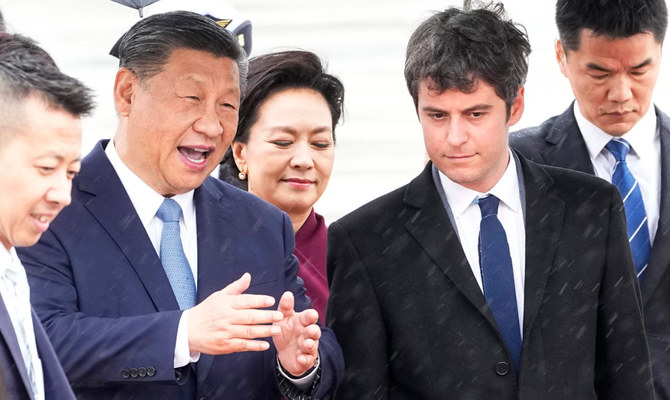
- Tuesday will see Macron take Xi to the Pyrenees mountains to an area he used to visit as a boy for a day of less public talks
PARIS: Chinese President Xi Jinping arrived in France Sunday on a state visit hosted by Emmanuel Macron where the French leader will seek to warn his counterpart against backing Russia in the conflict over Ukraine.
Xi’s arrival for the visit marking 60 years of diplomatic relations between France and China heralded the start of his first trip to Europe since 2019, which will also see him visit Serbia and Hungary.
But Xi’s choice of France as the sole major European power to visit indicates the relative warmth in Sino-French relations since Macron made his own state visit to China in April 2023 and acknowledges the French leader’s stature as an EU powerbroker.
The leader of the one-party Communist state of more than 1.4 billion people, accompanied by his wife Peng Liyuan, was welcomed under umbrellas at a drizzly Paris Orly airport by Prime Minister Gabriel Attal.
Xi is to hold a day of talks in Paris on Monday — also including EU Commission chief Ursula von der Leyen — followed by a state banquet hosted by Macron at the Elysee.
Tuesday will see Macron take Xi to the Pyrenees mountains to an area he used to visit as a boy for a day of less public talks.
In an op-ed for Le Figaro daily, Xi said that he wanted to work with the international community to find ways to solve the conflict sparked by Russia’s invasion of Ukraine, while emphasising that China was “neither a party nor a participant” in the conflict.
“We hope that peace and stability will return quickly to Europe and intend to work with France and the entire international community to find good paths to resolve the crisis,” he wrote.
A key priority of Macron will be to warn Xi of the danger of backing Russia, with Western officials concerned Moscow is already using Chinese machine tools in arms production.
Beijing’s ties with Moscow have, if anything, warmed after the invasion and the West wants China above all not to supply weapons to Russia and risk tipping the balance in the conflict.
“It is in our interest to get China to weigh in on the stability of the international order,” said Macron in an interview with The Economist published on Thursday.
Macron also said in the interview that Europe must defend its “strategic interests” in its economic relations with China, accusing Beijing of not respecting the rules on international trade.
But he acknowledged in an interview with the La Tribune Dimanche newspaper that Europeans are “not unanimous” on the strategy to adopt as “certain actors still see China essentially as a market of opportunities” while it “exports massively” to Europe.
The French president had gladdened Chinese state media and troubled some EU allies after his 2023 visit by declaring that Europe should not be drawn into a “bloc versus bloc” standoff between China and the United States, particularly over democratic, self-ruled Taiwan.
China views the island as part of its territory and has vowed to take it one day, by force if necessary.
Rights groups are urging Macron to bring up human rights in the talks, accusing China of failing to respect the rights of the Uyghur Muslim minority and of keeping dozens of journalists behind bars.
“President Macron should make it clear to Xi Jinping that Beijing’s crimes against humanity come with consequences for China’s relations with France,” said Maya Wang, acting China director at Human Rights Watch.
The group said human rights in China had “severely deteriorated” under Xi’s rule.
A crowd of protesters on Sunday unfurled a Tibetan flag at a demonstration in Paris, accusing Xi of being a “dictator” and wanting to erase local culture in the Tibet region, an AFP reporter said. Paris police put the number of protesters at two thousand.
However analysts are skeptical that Macron will be able to exercise much sway over the Chinese leader, even with the lavish red carpet welcome and a trip to the bracing mountain airs of the Col du Tourmalet over 2,000 meters (6,560 feet) above sea level on Tuesday.
The other two countries chosen by Xi for his tour, Serbia and Hungary, are seen as among the most sympathetic to Moscow in Europe.
“The two core messages from Macron will be on Chinese support to Russia’s military capabilities and Chinese market-distorting practices,” said Janka Oertel, director of the Asia program at the European Council on Foreign Relations.
“However, both messages are unlikely to have a significant impact on Chinese behavior: Xi is not on a mission to repair ties, because from his point of view all is well.”



